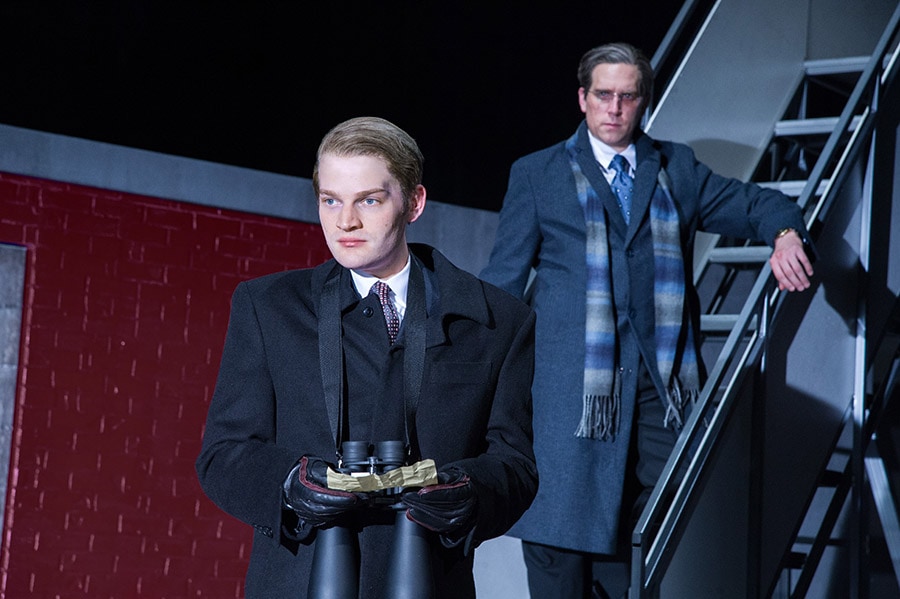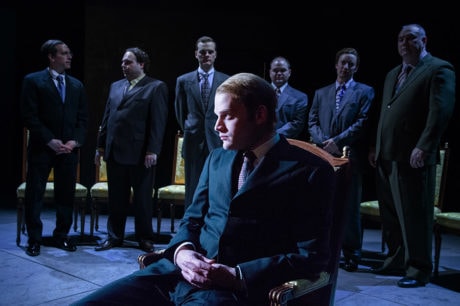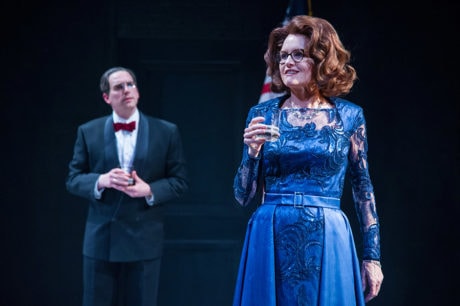A young Vladimir Putin (Christopher Geary) steps onto the stage, wearing a 1980s tracksuit, quoting a passage from the Soviet absurdist and surrealist writer Daniil Kharms (1905-1942) “How a Man Crumbled” – purringly relishing the line “the best tarts are fat-arsed.” He flippantly declares that he doesn’t understand what it means, suggesting that if he repeats it a few more times maybe we will.
Playwright Kenneth Lin, best known as the Emmy-nominated writer for the Netflix series, House of Cards (for which he wrote six episodes) is foreshadowing Putin’s repetition of the same passage a few more times over the course of Kleptocracy, Lin’s historical fiction about how post-Soviet Russia came to be ruled by oligarchs and how the oligarchs came to be ruled by Putin.

In the early days of the breakup of the Soviet Union, future oligarch Mikhail Khodorkovsky (Max Woertendyke) is hustling on the cold Moscow streets. American consultants have flocked to Boris Yeltsin’s Russian Federation to oversee the privatization of state-controlled industries. Citizens have been issued vouchers to purchase shares, but with the collapse of the Russian economy, many are selling their vouchers just to put food on the table. Khodorkovsky is buying up vouchers with hopes of purchasing his own bank.
The action skips ahead to 1998 when Khodorkovsky is celebrating his birthday along with fellow executives of the Yukos Oil Company – which he and his bank partners had acquired from the government in 1995. Putin, a month before his appointment as Federal Security Service Director, is in attendance. Mikhail and company are trying to figure out how to deal with Vladimir Petukhov (Elliot Bales) the mayor of Nefteyugansk, who is engaged in a hunger strike to protest the local Yukos operation’s failure to pay taxes or pay the oil field workers a living wage. Conveniently, the troublesome local politician is assassinated.
By 2003, Khodorkovsky has cleaned up Yukos’ business practices, and becomes the most visibly reform-minded of Russian oligarchs, vocally campaigning against both public and private corruption. Putin, now president, responds with a classic whataboutism: How can someone whose own fortune came about through exploitative means possibly object to corruption?
Meanwhile, Khodorkovsky attempts to sell Yukos to ChevronTexaco with plans to use the profits from the sale to fund philanthropic pursuits and the promotion of civil society, including NGOs that advocate for press freedoms and human rights, as well as liberal political parties that aim to bring down Putin’s autocratic rule. In Washington, an unnamed official with a Texas accent in the George W. Bush White House, played by Candy Buckley, wants to expedite the deal since corporate interests and current Russia policy coincide in Khodorkovsky. Not surprisingly, just before intermission, Putin has Khodorkovsky arrested for tax evasion and fraud. (Khodorkovsky was released from prison in 2013, and he now lives as an expatriate in the United Kingdom where he continues to support pro-democracy efforts in Russia.)
While Lin is ambitious in his selection of subject matter, on the night of Kleptocracy‘s premiere, the script still shows all the hallmark signs of having been put into the production schedule before there was a final draft. There are scenes that show some promise, but much of the narrative is remarkably underdeveloped, and many scenes are marked by lackluster dialogue. Bold choices in terms of character and action are avoided – instead, there are incidents and set pieces presented in sequence.

Lin cannot find a point of view for his own play. While he certainly implies that Khodorkovsky bears responsibility for Petukhov’s assassination, Lin seems unwilling to imagine how a protagonist can be involved with crime and also be a campaigner for democracy and civil society. Nor does Lin consider any of the questions around Petukhov’s murder. In 2008, a Russian court convicted Khodorkovsky associate Leonid Nevzlin (played by Joseph Carlson) for the assassination in absentia, but courts in Israel, where Nevzlin has lived since 2003, rejected the extradition request, citing a lack of evidence.
Lin neither gives the killing much dramatic weight nor fosters any questions of what really happened. Did Khodorkovsky have some reckoning with his conscience? Is his career as a philanthropist, reformer, and dissident nothing more than a cynical ploy? Were Russia’s would-be reformers reformed murderers? Liberals with a Machiavellian streak? Have they simply been framed by a media-savvy dictator who wanted them in exile? Will Putin arrive at an allegorical understanding about tarts, arses, and slant-rhyme? Is it really true that all the best tarts are fat-arsed?
A drama need not provide answers to these questions in order to be interesting, but should at least have the audience asking these questions. If Lin has decided upon an answer, he does not appear to have shared it with either Director Jackson Gay or with the actors in the cast – but it also does not appear that they’ve asked him either.
The political journey of the real Khodorkovsky may be fascinating, but the guy on stage is a cipher. Lin seems to draw more inspiration when writing for his fictional Putin, whom Geary plays in a campy, over-the-top manner—though he seems positively tame compared to the real-life President who has been implicated in the use of nerve agents against dissidents already living in exile. Likewise, the unnamed administration official played by Buckley could easily be a character from House of Cards. She may be crass, but she understands the larger political picture even if she, like many others, underestimates Vladimir Putin. The dramatic sparks are the most scintillating in the one scene these two share — though Putin’s prophecy that “Your president will be my dog” is, in 2019, less shocking than a statement of the obvious. Yes, the emperor wears no clothes.

Set Designer Misha Kachman’s set offers a drab stage (dimly lit by lighting designer Masha Tsimring) that evokes an old industrial loft, though the Yukos sign with Cyrillic lettering to stage right provides some color. Kachman makes more interesting choices with furniture and tiger-themed props that accompany the Putin monologues. Projection Designer Nicholas Hussong, however, makes good use of the walls, providing some evocative animations as well as photomontages that recall early Soviet-era constructivism. Fight Director Lewis Shaw’s stage violence is more perfunctory than impactful, and only feels “realistic” on account of the stage blood. Dave Bova provides good hair and wig stylizing and makeup to account for the decades that pass from beginning to end.
Broken Chord’s original music and sound design consistently rises above the material, incorporating piano, percussion, sound collage, and a Russified minor-key arrangement of “Happy Birthday.”
The buzz around Lin for his television work and past playwriting prizes all but guarantees that Kleptocracy will make its rounds on the regional theater circuit once its run at Arena Stage is done. However, one hopes there will be much-needed rewrites between now and then, so that maybe there will be a revised version at least half as “fearless” as the posters proclaim in the Arena’s lobby.
Running time: One hour and forty-five minutes, with a fifteen-minute intermission.
Kleptocracy plays through February 24, 2019, at Arena Stage – 1101 Sixth Street SW, in Washington, DC. For tickets call 202-488-3300 or order online.





And this is an example of “truthful and unbiased” journalism? Seriously? The author generally understands what logic is? He doesn’t understand law in law, _______ but considers himself right to give his conjectures as facts__________.
“Nor does Lin consider any of the questions around Petukhov’s murder. In 2008, a Russian court convicted Khodorkovsky associate Leonid Nevzlin (played by Joseph Carlson) for the assassination in absentia, but courts in Israel, where Nevzlin has lived since 2003, rejected the extradition request, citing a lack of evidence.”
“The political journey of the real Khodorkovsky may be fascinating, but the guy on stage is a cipher. Lin seems to draw more inspiration when writing for his fictional Putin, whom Geary plays in a campy, over-the-top manner—though he seems positively tame compared to the real-life President ____who has been implicated in the use of nerve agents against dissidents already living in exile_____.”
Amazing deceitful hypocrisy, amazing!
VV:
I’m not entirely clear as to either your logic, or the precise logical flaw in my argument that you allege. Perhaps you could explain your position without resorting to insults and adjectives?
My point is that dramatically speaking, playwright Kenneth Lin’s portrayal of Khodorkovsky as oligarch, and kleptocrat, on one hand, and democracy and reform activist on the other, is unsatisfactory — and this lack of a character through line prevents the actor from investing into the performance. Perhaps, because Lin is a writer of episodic television, he does not normally worry about such things because the writer of another episode can write something that makes this characterization work.
As to the matter of law: the assassination of Petukhov is a key plot point of the play. There is a significant disagreement between the Russian court that tried Leonid Nevzlin in absentia for his alleged role in the murder, and the Israeli court that denied the extradition request on lack of evidence. I do not claim expert knowledge of the murder of Petukhov, but I do fault Lin for not addressing that dispute in a dramatically satisfying way given that there is some dispute — again, like a writer of episodic television, he seems to be expecting another writer to pick up the slack.